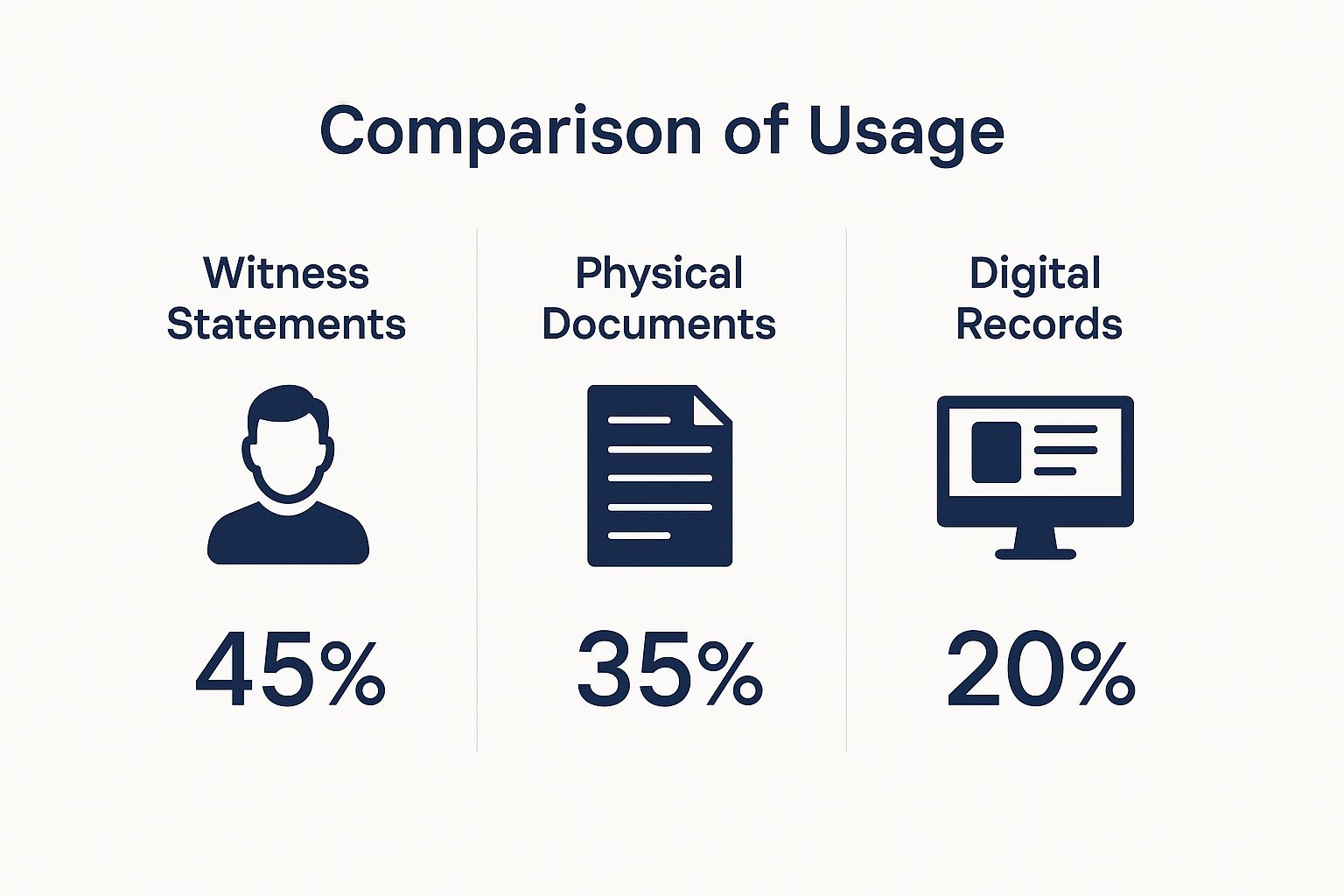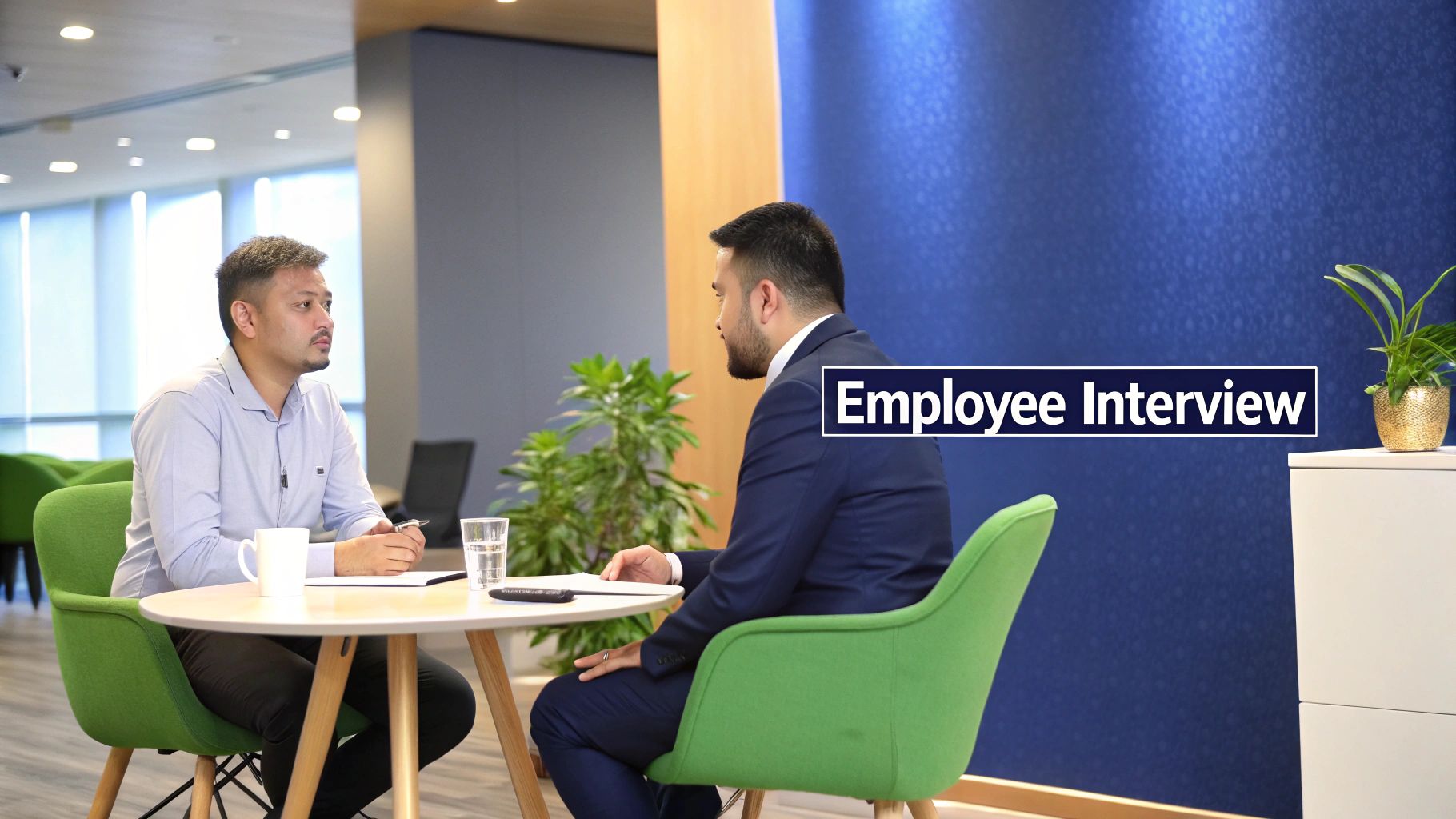Mastering Conducting a Workplace Investigation: UK Guide
- Sentry Private Investigators

- May 18, 2025
- 13 min read
Updated: Jul 28, 2025
Why Proper Workplace Investigations Matter Now

Conducting a workplace investigation in the UK is no longer a reactive measure; it's a proactive necessity. The regulatory environment emphasises fair and thorough processes more than ever before. This increased scrutiny coincides with a rise in workplace disputes reaching formal legal channels.
For example, employment tribunal claims saw a significant jump between April 2023 and March 2024. Claims rose from 86,000 to 97,000, a yearly increase of nearly 13%. These claims often involve issues like discrimination, harassment, and wage disputes, revealing persistent challenges for UK businesses. More detailed statistics can be found here: Employment Tribunal Statistics UK. Robust investigation procedures are now more crucial than ever.
The Shield and Sword of Proper Investigations
Well-executed workplace investigations offer significant protection for organisations. They act as a shield against costly litigation and reputational harm. They also serve as a sword, allowing businesses to address unacceptable workplace behaviours and cultivate a culture of accountability. This dual nature highlights their strategic importance.
Transforming Workplace Culture
Modern employers recognise that investigations are not just about resolving individual issues. They are valuable opportunities for learning and growth. By carefully analysing investigation findings, companies can pinpoint systemic problems, refine internal policies, and foster a more positive work environment. This proactive approach shows a commitment to employee well-being and long-term organisational success.
The Rising Tide of Tribunal Claims
The upward trend in tribunal claims underscores the need for effective investigations. A poorly managed investigation can worsen existing problems and create new legal vulnerabilities. Conversely, a well-conducted investigation can demonstrate a commitment to fairness and due process, potentially reducing legal risks and strengthening the company's position in any legal action. Maintaining compliance is paramount, and new technologies can be helpful. Learn more here: Why Your AI Receptionist Might Be Your Best Compliance Officer. In the current climate, mastering workplace investigations is essential for any organisation aiming to build a fair, productive, and legally compliant workplace.
Designing Your Investigation Blueprint
A successful workplace investigation requires careful planning. Much like constructing a building, a solid blueprint is essential for a strong, stable outcome. This section explains how to take initial complaints and turn them into structured inquiries, ensuring a fair and legally sound process.
Defining the Scope and Objectives
First, you must define the scope of the investigation. What specific allegations need to be investigated? What outcome are you hoping for? Clearly outlining these parameters keeps the investigation focused and helps avoid scope creep, which can lead to delays and increased costs. This clarity also manages stakeholder expectations and maintains procedural fairness.
Assembling the Right Team
Next, consider the team you will assemble. For less complex cases, internal HR professionals may be sufficient. However, if the allegations are sensitive, such as harassment or discrimination, an external investigator offers valuable objectivity and expertise. The Safecall Workplace Investigation Survey 2025 revealed interesting statistics about UK organisations. Approximately 69.12% conducted between one and five investigations in the past year, while 30.88% managed more than five. This difference suggests varying levels of case complexity across different organisations. Choosing the right team is crucial for a credible and unbiased investigation.
To help you decide whether to use internal or external investigators, the following table summarises some key benefits and limitations of each.
This table compares the benefits and limitations of using internal staff versus external investigators when conducting workplace investigations.
Factor | Internal Investigators | External Investigators |
|---|---|---|
Cost | Less expensive | More expensive |
Speed | Potentially faster | Can be slower due to onboarding |
Familiarity with Organisation | High | Low |
Objectivity | Can be perceived as biased | More likely to be perceived as neutral |
Expertise | May lack specialised investigative skills | Possess specialised training and experience |
Legal Privileges | May be subject to legal discovery | Some communications may be protected by legal privilege |
As you can see, internal investigators might be a more economical choice, but external investigators bring an added layer of impartiality and specialised skills. Carefully consider these factors when assembling your investigative team.
Documentation and Timelines
A robust documentation system is paramount. This system should include secure storage for witness statements, physical documents, and digital records. The following infographic visualises the typical evidence breakdown in workplace investigations.

Witness statements make up the largest portion of gathered evidence (45%), followed by physical documents (35%) and digital records (20%). This breakdown highlights the importance of meticulously collecting and preserving all types of evidence.
Setting Realistic Timelines
Establishing a realistic timeline is crucial. You need to balance a thorough investigation with a timely resolution. Consider the complexity of the allegations, the availability of witnesses, and the resources available. A well-defined timeline keeps the investigation moving forward efficiently, ensures fairness to all parties involved, and minimises disruption to the workplace. A clear blueprint is essential for conducting an effective workplace investigation.
Evidence Collection That Stands Up to Scrutiny

The success of a workplace investigation hinges on the quality of evidence gathered. This means the evidence needs to be credible, relevant, and collected in a legally sound manner. This section explores advanced techniques for collecting evidence that accurately reflects the situation.
Creating a Psychologically Safe Interview Environment
Creating a psychologically safe space for interviews is paramount. Skilled investigators recognise this encourages open communication. When individuals feel safe, they are more likely to share candid and comprehensive accounts.
Open-ended questions and active listening techniques can foster rapport and trust. These techniques are essential for gathering accurate and detailed information. This helps paint a clearer picture of the events in question.
Systematic Documentation of Evidence
A systematic approach to documentation is key. This involves meticulous record-keeping of everything from witness statements to digital communications and physical evidence.
Creating a clear timeline of events adds crucial context. This organised approach helps investigators piece together the narrative and ensures important details aren't missed. A thorough record also strengthens the investigation's credibility.
Handling Conflicting Accounts and Reluctant Witnesses
Conflicting accounts and reluctant witnesses are common challenges. Experienced investigators, however, have strategies to navigate these difficulties effectively.
One such strategy involves using corroborative evidence. This helps verify statements and address discrepancies. Successfully managing these challenges is crucial for reaching accurate conclusions.
Preserving Evidence Integrity: Chain of Custody
Maintaining the integrity of the evidence is paramount. This requires establishing a clear chain of custody. This process tracks every individual who handles the evidence, documenting their involvement.
Think of it like a relay race, with each hand-off carefully recorded. This meticulous documentation ensures authenticity and admissibility, safeguarding against claims of tampering.
Managing Digital Evidence
Digital evidence, such as emails and instant messages, plays a significant role in modern investigations. Handling this evidence correctly requires specialised techniques.
Using secure data storage and forensic software like EnCase is essential. These steps protect sensitive information and maintain the investigation's integrity.
Common Evidence Pitfalls and Mitigation Strategies
Understanding common pitfalls can prevent missteps. One example is failing to document the context surrounding the evidence. This can weaken its value and impact the investigation.
Another pitfall is relying on hearsay, which is generally inadmissible. By being aware of these potential problems, investigators can take proactive steps to avoid them.
Best Practices for UK Workplace Investigations
UK workplace investigations must adhere to specific legal frameworks. This includes understanding data protection laws like GDPR and ensuring fairness. Investigators must also be aware of the balance of probabilities standard.
This legal standard means it's more likely than not that the alleged event occurred. Adhering to best practices ensures a legally sound investigation. A thorough understanding of evidence collection techniques is essential for effective UK workplace investigations. For more information, visit our website.
Navigating Violence and Harassment Investigations
Investigating allegations of violence and harassment requires a sensitive and specialised approach. This is especially true in the UK, where specific legislation and best practices necessitate a nuanced understanding of both the legal and human aspects involved. This section explores how experienced investigators handle these complex and often emotionally charged cases.
Trauma-Informed Investigation Techniques
When dealing with sensitive allegations like violence or harassment, a trauma-informed approach is paramount. This approach recognises the potential impact of trauma on everyone involved and adjusts investigative techniques accordingly.
For instance, interviews are conducted in a supportive and non-confrontational manner to minimise any further distress to the individuals involved. It also means providing resources and support to affected parties throughout the entire investigative process. This careful approach balances the need for a thorough investigation with the well-being of all those involved.
Balancing Support and Procedural Fairness
Providing support is crucial, but it's equally vital to maintain procedural fairness. All parties involved, including the accused, must have a fair opportunity to present their side of the story and be heard.
This necessitates adhering to established procedures and ensuring complete impartiality throughout the entire investigation. This careful balance between support and fairness is the cornerstone of a credible and just outcome.
Interview Frameworks and Risk Assessment
Specific interview frameworks are employed to gather the necessary details while minimising the risk of re-traumatisation. These frameworks often involve phased questioning and the use of open-ended questions to encourage a narrative approach, allowing individuals to share their experiences in their own words.
A thorough risk assessment is also a vital component. This assessment helps investigators identify any potential continuing threats and informs appropriate interim protective measures. These measures might include temporary reassignment or changes to working arrangements. It's important to note that such precautions are taken without prejudging the outcome of the investigation. Workplace violence and harassment are significant issues in the UK, with 642,000 reported incidents of workplace violence between March 2023 and March 2024. This figure includes 352,000 threats and 290,000 physical assaults. You can find more detailed statistics on Violence and Harassment in the Workplace.
Specialised Documentation and Legal Considerations
Documenting sensitive information requires careful consideration and attention to detail. Investigators must maintain meticulous records while adhering to strict confidentiality and data protection requirements. For effective evidence gathering, you might want to explore strategies to Master Document Collection.
Successful investigators must also be adept at navigating the complex legal definitions under UK harassment legislation. They must possess a comprehensive understanding of the nuances of the law while maintaining a human approach throughout the process. This dual focus ensures a legally sound and compassionate investigation. Learn more about our Services. Navigating violence and harassment investigations demands a specialised skillset. By combining trauma-informed techniques, balancing support with fairness, and understanding the relevant legal framework, investigators can effectively address these sensitive situations and contribute to safer and more respectful workplaces.
Turning Evidence Into Defensible Conclusions

After carefully gathering evidence, the next vital step in a workplace investigation is analysing that information. This process aims to form well-supported conclusions. It involves assessing credibility, resolving conflicting accounts, and applying the relevant legal standard. This section will guide you through how seasoned investigators transform complex data into clear, defensible findings.
Assessing Credibility and Resolving Conflicts
One of the main challenges in any investigation is determining the credibility of witnesses. It's also important to resolve inconsistencies in their statements. Experienced investigators use several strategies to achieve this.
For example, they look for corroborating evidence. This supporting information might include emails, documents, or other witness testimonies. These can help to either support or refute specific claims. Investigators also carefully consider the demeanour and consistency of witnesses throughout the investigation.
Furthermore, investigators must be skilled at recognising and addressing cognitive biases. These inherent tendencies can unconsciously influence our judgment. For instance, confirmation bias is the tendency to favour information that confirms pre-existing beliefs. This can impact an investigation’s objectivity. Techniques to mitigate these biases include rigorous self-reflection and seeking outside perspectives.
Applying the Balance of Probabilities Standard
In the UK, employment tribunals use the balance of probabilities standard. This means that for a claim to succeed, it must be more likely than not to have occurred. This is different from the "beyond a reasonable doubt" standard used in criminal cases.
Investigators must carefully weigh all evidence. This determines whether the evidence meets the required standard. This meticulous process helps ensure conclusions are justified and legally sound.
Organising Evidence and Identifying Patterns
Effective analysis requires a systematic approach to organising evidence. A common method involves creating a chronological timeline. This timeline incorporates all relevant information, including witness statements, documents, and digital records. This visual representation can help investigators spot key patterns, connections, and inconsistencies.
For example, discrepancies in timelines or missing information might point to areas needing further investigation. This approach ensures a thorough and well-documented process.
Handling Inconclusive Situations and Documenting Reasoning
Not every investigation leads to clear-cut findings. Sometimes, the available evidence isn't enough to reach a conclusion based on the balance of probabilities. In these situations, it’s vital to document the reasons for the inconclusive outcome.
Transparency is essential. Documenting every step, including the reasoning behind decisions, demonstrates a thorough and fair process. This documentation is crucial. It shows the investigation was conducted diligently, even without a definitive conclusion.
By using these systematic methods and focusing on objectivity, investigators can ensure their conclusions are well-supported and defensible, contributing to a fair resolution. For expert assistance with workplace investigations in the UK, contact Sentry Private Investigators Ltd.
Creating Reports That Drive Meaningful Action
A powerful investigation report doesn't just document findings; it sparks real change. This section explores the crucial elements of exceptional reports that can stand up to scrutiny from stakeholders, legal teams, and tribunals in the UK.
Structuring a Robust Report
A well-structured report is essential for clarity and impact. Begin with a concise executive summary. This snapshot of the investigation's purpose, scope, and key findings allows readers to quickly grasp the core information.
A detailed methodology section follows, outlining the steps taken, ensuring procedural fairness, and demonstrating transparency. This includes explaining the evidence collection process, the interviews conducted, and any limitations encountered.
Next, present the findings clearly and logically, directly linking the evidence to the conclusions. For example, if an allegation of bullying is upheld, the report should explicitly connect specific witness statements, emails, or other evidence that supports this conclusion. This strengthens the report's credibility.
Finally, offer practical recommendations addressing the immediate issues and bolstering organisational systems. This proactive approach resolves the current situation and helps prevent similar incidents in the future.
Balancing Transparency and Confidentiality
Transparency is vital, but it must be balanced with confidentiality and data protection. UK law, specifically GDPR, mandates the protection of personal data. Reports must be redacted to remove identifying information not essential to the findings. This ensures the investigation is thorough and legally compliant.
Communicating Findings Effectively
Delivering findings requires a strategic approach, as different stakeholders need varying levels of detail and context. A summary for senior management might focus on key findings and recommendations, while legal counsel might require a more comprehensive report. Business leaders in the UK are significantly affected by tribunal cases. Around 20% report spending substantial time managing claims, and about 33.2% have faced personal discrimination claims. Yet, despite these challenges, 28.2% have seen tribunal outcomes lead to positive policy changes. More statistics are available at Employment Tribunal Statistics UK.
Best Practices for UK Report Writing
When writing for a UK audience, ensure the language is regionally appropriate. Avoid jargon and excessively formal language; aim for clarity and conciseness. A logical structure with clear signposting, like headings and subheadings, aids navigation. Presenting findings neutrally and objectively enhances credibility.
By focusing on these key elements, you can create reports that full-fill legal requirements and drive meaningful workplace change. These reports become valuable tools for improving workplace culture, preventing future issues, and fostering a more positive and productive environment. A well-written report is a powerful instrument for promoting fairness, accountability, and positive change within any organisation. For professional guidance, contact Sentry Private Investigators Ltd.
Overcoming Investigation Roadblocks
Conducting a workplace investigation isn't always easy. Even with the best planning, unexpected issues can pop up and threaten to disrupt the entire process. This section offers practical solutions to common roadblocks UK organisations face when conducting these investigations.
Handling Uncooperative Witnesses
A frequent challenge is dealing with witnesses who are reluctant to cooperate. Some might be afraid of repercussions, loyal to the accused, or simply want to avoid getting involved. However, a successful investigation depends on gathering information from everyone involved.
This means investigators need strategies to encourage cooperation without putting undue pressure on anyone. Clearly explaining the investigation's purpose and highlighting the importance of their participation can often ease concerns. Additionally, reminding witnesses of company policies regarding cooperation with investigations, along with assurances of confidentiality and protection from retaliation, can build trust.
Managing Confidentiality Breaches
Confidentiality is crucial throughout the entire investigation. Breaches can jeopardise the investigation's integrity, damage reputations, and even lead to legal problems. For instance, if details are leaked, witness testimony could be influenced, evidence tampered with, and individuals involved might experience unnecessary stress.
Therefore, establishing clear procedures for handling sensitive information is vital. This includes restricting access to documents, using secure storage methods, and reminding everyone involved about their confidentiality obligations. Taking swift action to address any breaches is key to minimising damage and maintaining trust.
Navigating Politically Sensitive Cases
Investigations that involve senior management or influential figures present unique difficulties. These situations can be politically charged, impacting power dynamics and organisational stability. They require careful handling to ensure fairness and impartiality.
Investigators must remain completely objective. This involves strictly adhering to established procedures, meticulously documenting every step, and consulting with external legal counsel when necessary. This protects the investigation's integrity, builds confidence in the process, and reduces the risk of bias accusations.
Addressing Time Management and Resource Constraints
Time management is essential, especially since investigations can be complex and lengthy. Most workplace investigations are completed within 1 and 4 weeks. However, a significant 67.74% of respondents in a recent survey reported cases exceeding one month, often due to procedural delays or complexities. You can find more detailed statistics in the Safecall Workplace Investigation Survey 2025. This emphasises the importance of efficient processes.
Resource limitations are another common issue, particularly for smaller businesses. The same survey revealed that only 38.79% of organisations have properly trained investigators. Furthermore, 73.28% rely on generic or paper-based systems, impacting efficiency and accuracy. This reliance on outdated systems can result in delays, higher costs, and potential errors.
Many leading organisations are addressing these challenges by adopting technology solutions. These range from secure document management systems to dedicated case management software. Such solutions streamline processes, improve data security, and free up valuable time and resources, allowing investigators to concentrate on the core aspects of their work.
To further illustrate the duration of workplace investigations, let's look at some statistics:
Workplace Investigation Duration Statistics
This table presents data on the typical timeframes for completing workplace investigations in UK organisations.
Duration | Percentage of Cases | Primary Factors Influencing Timeline |
|---|---|---|
1-2 weeks | 15% | Straightforward cases, readily available evidence, cooperative witnesses |
2-4 weeks | 17.26% | Moderate complexity, some delays in gathering evidence or witness testimonies |
4-8 weeks | 29% | Complex cases, multiple witnesses, difficult-to-obtain evidence, potential legal challenges |
Over 8 weeks | 38.74% | Highly complex cases, extensive legal involvement, uncooperative witnesses, significant procedural hurdles |
This data highlights the significant percentage of cases that extend beyond the initial estimated timeframe, underscoring the need for robust processes and adequate resources.
Building Investigation Capability
Developing strong investigation capabilities is strategically important for all organisations. This goes beyond training investigators and involves creating a culture that values thorough and impartial investigations.
This means investing in professional development for investigators, providing access to current resources and legal guidance, and implementing clear investigation protocols. By prioritising investigation capability as a core competency, businesses can effectively navigate the complexities of workplace investigations and foster a more fair, respectful, and legally compliant work environment.
For professional, discreet, and confidential investigative services tailored to your organisation’s requirements, contact Sentry Private Investigators Ltd. We offer expert support and guidance through every stage of the process, assisting you in navigating challenges and achieving a fair resolution.




Comments